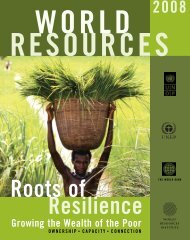jp8589 WRI.qxd - World Resources Institute
jp8589 WRI.qxd - World Resources Institute
jp8589 WRI.qxd - World Resources Institute
You also want an ePaper? Increase the reach of your titles
YUMPU automatically turns print PDFs into web optimized ePapers that Google loves.
TURNING<br />
NATURAL<br />
ASSETS INTO<br />
WEALTH<br />
CHAPTER 5<br />
In <strong>World</strong> <strong>Resources</strong> 2005 we have argued that environmental income is the wealth of the poor,<br />
with the potential to provide not just subsistence but a path out of poverty if the right governance<br />
conditions prevail. In many communities, this argument is borne out every day, in<br />
on-the-ground, village-level experience.<br />
he five case studies in this chapter come from far-flung parts of the world—communities in<br />
different physical environments and with different histories and cultural values. In each case, a<br />
poor rural community shows us how it has learned to restore and manage its local ecosystems<br />
for greater production, and how it has turned these natural assets into higher household income.<br />
But the heart of these stories is how communities have tried to meet the challenge of democratic<br />
governance. These cases are testaments to the difficulty and rewards of pursuing communitybased<br />
natural resource management that is inclusive of the poor. Finally, these studies remind<br />
us that each situation faced by the rural poor is unique, but that the desire for better lives—<br />
materially, culturally, and spiritually—is universal.<br />
Nature in Local Hands: The Case for Namibia’s Conservancies<br />
Devolving wildlife management and tourism to local conservancies for greater income opportunities.<br />
Page 114.<br />
More Water, More Wealth in Darewadi Village<br />
Village-led water management to conserve natural resources and improve livelihoods. Page 124.<br />
Regenerating Woodlands: Tanzania’s HASHI Project<br />
Restoration of woodlands based on the traditional practice of restoring vegetation in protected<br />
enclosures. Page 131.<br />
Bearing Witness: Empowering Indonesian Communities to Fight Illegal Logging<br />
Training forest-dependent people to document illegal logging practices. Page 139.<br />
Village by Village: Recovering Fiji’s Coastal Fisheries<br />
Restoring coastal resources by linking traditional conservation practices with modern<br />
techniques to create locally managed marine areas. Page 144.

















